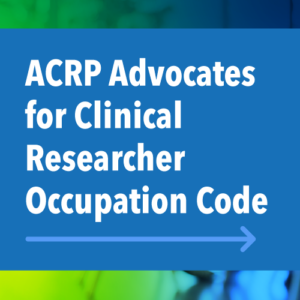The Association of Clinical Research Professionals (ACRP), the trusted global authority for training clinical research professionals, announced today a strategic partnership with ScienceMedia, a global SaaS clinical trial training solution provider.
ACRP strongly encouraged the U.S. Bureau of Labor Statistics to recognize the distinct role of clinical research by introducing a new detailed SOC Code under the Healthcare Professionals classification. This SOC Code will improve visibility and recognition of this occupation, helping to track and address the current severe shortage of qualified clinical researchers and advance medical research to the benefit of public health.
Expert speakers attending ACRP 2025 in New Orleans next April offer a path out of the recruitment murkiness and into the light in their session on “Best Advertising Practices and Partnerships for Patient Recruitment Success.” This diverse group will present perspectives from sponsors, contract research organizations (CROs), sites, and IRBs.
Sometimes in the realm of evolving clinical research regulations, the maxim about “be careful what you wish for” can more accurately be phrased as “be aware of it when you get what you asked for.” Such is the case with recently proposed U.S. Food and Drug Administration (FDA) guidance updating the agency’s expectations for the contents of informed consent forms for clinical trial participants, says an expert who will explain the history behind the updates and their ramifications for stakeholders at the ACRP 2025 conference in New Orleans in April.
A scholarship powered by the long-distance cycling adventures of some of the ACRP Community’s greatest equity champions and their backers has gone the distance on the other side of the globe this year, resulting in a completed prostate cancer project for Esther Samuel in Nigeria, who was among the initial recipients of ACRP Access for Students to Clinical Research Training (ASCRT) program support.




